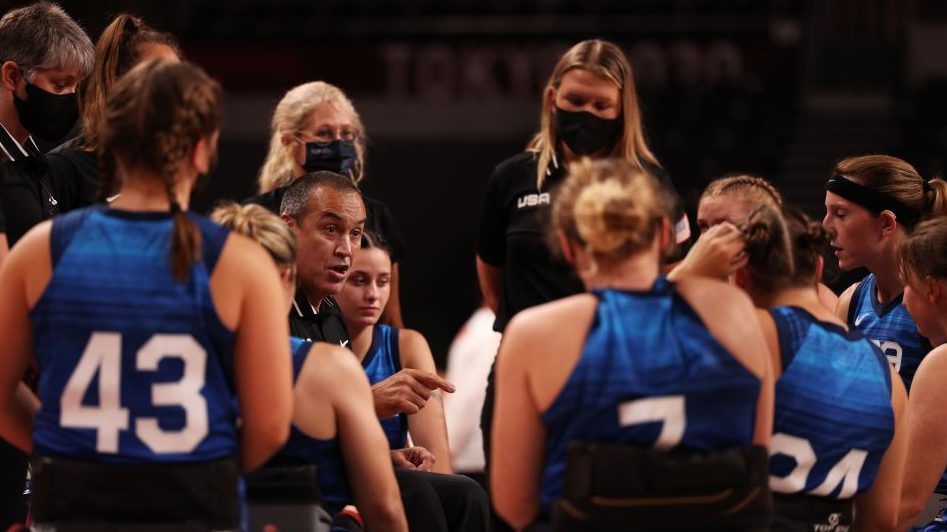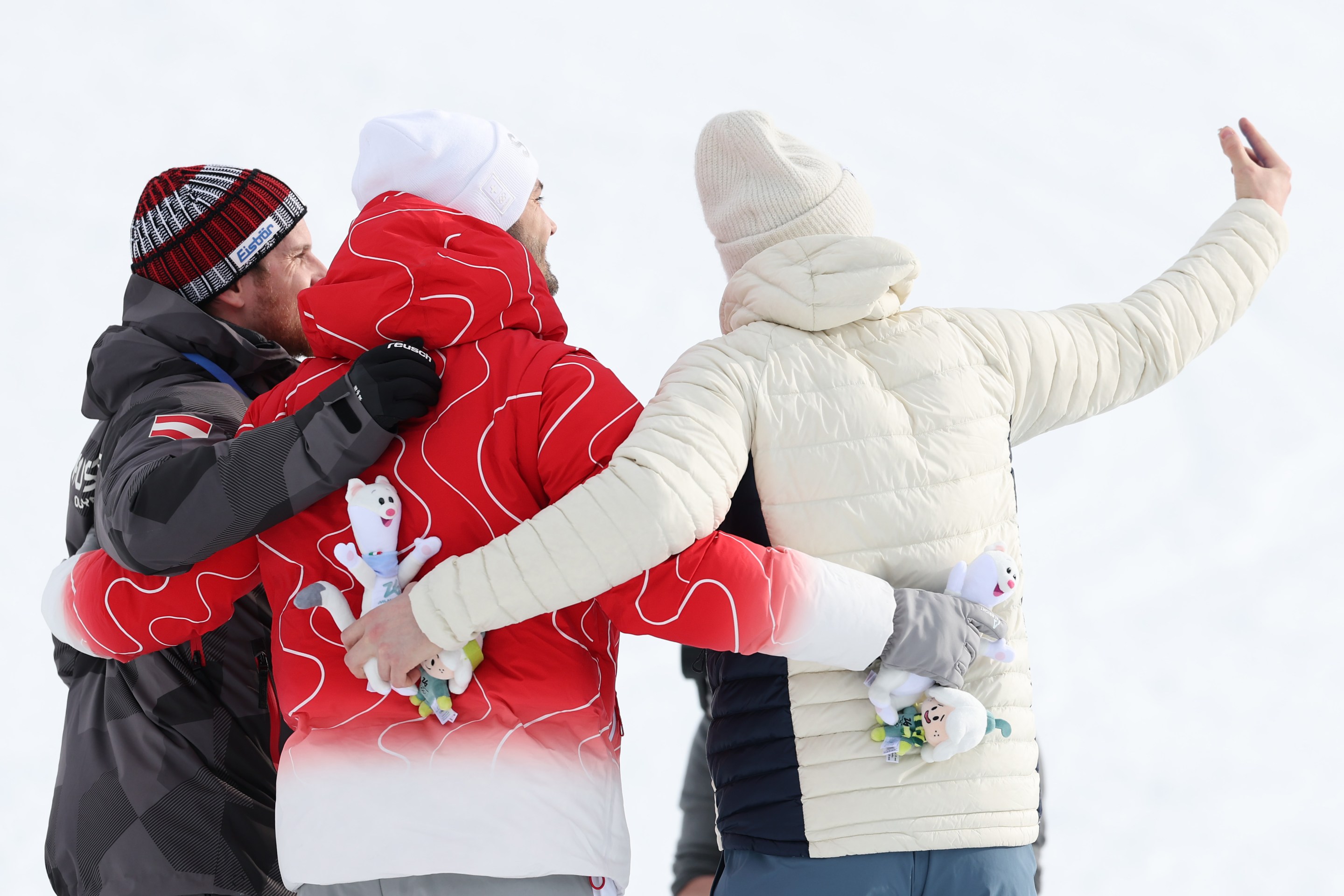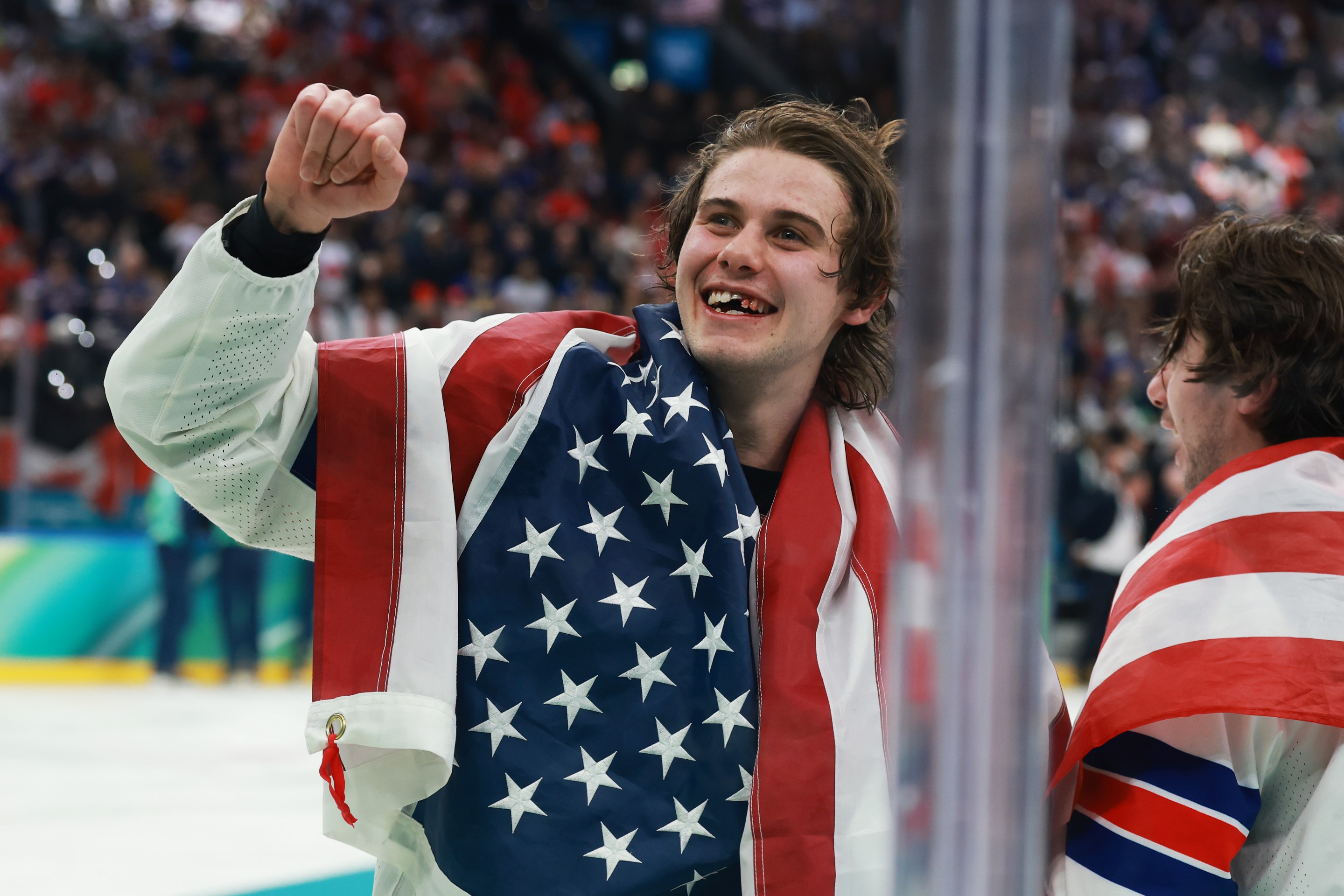“I’ve been told multiple times that I can’t make a layup to save my life,” said Kaitlyn Eaton, “that I’m not very good at shooting, that at my age and at my time in my basketball career if I haven’t developed that skill then there’s no point in me even trying anymore.” The person she says who'd told her all that was Lawrence "Trooper" Johnson, her Team USA coach and a seemingly invulnerable legend in the sport of wheelchair basketball.
Eaton was the first athlete to comment on the Facebook post announcing Johnson’s re-appointment as head coach of Team USA’s senior women’s national team, a position he had held from 2017–2020. Johnson, a four-time Paralympian and hall-of-famer—his silhouette is the logo of the National Wheelchair Basketball Association—had been part of the women’s team coaching staff since 2013, but on December 1, 2021, Eaton and a host of other athletes and supporters made public what had been brewing in the background for years. In the view of the athletes, Trooper had to go.
Amongst Johnson’s alleged transgressions: encouraging a weight-loss competition, demeaning athletes in front of their teammates, lacking empathy when an athlete tested positive for COVID-19, and being vindictive in his team selection. The athletes involved insisted to the NWBA that the organization couldn’t continue to claim it supported its athletes while still employing Johnson in an active role.
Even prior to his latest appointment as head coach of Team USA, Johnson had been the subject of an internal investigation into his conduct after a letter signed by the entire roster, according to team sources, was sent to NWBA leadership after the 2018 Women’s World Championships. At the conclusion of that investigation, athletes received an email from the then-chair of the governing body’s high-performance committee. That email said that the organization “needed to provide additional oversight, and to work with Trooper on some of the issues raised during the interviews, such as communication skills.” It also called into question the legitimacy of the athletes’ allegations: “It is our hope that people will no longer perpetuate a story line that reflects an ethical issue when our fact-finding feedback process revealed the opposite.”
Eaton understood then that nothing was going to come from sticking to so-called proper channels. She knew that if anything was going to change, she would have to go public. She did, and a flood of other athletes followed, relaying their experiences under Johnson and demanding action. Nine days later, amid growing pressure and an ongoing investigation by the U.S. Center for SafeSport, Johnson resigned.
Even with Johnson out of the top job, athletes who played under him still want to talk about what happened—to help fans understand the extent of the problem, or to keep Johnson from getting another coaching job in the future, or just because no one had ever listened to them before. A number of them shared their stories with Defector.
Morgan Wood-Hill was a co-captain at the 2018 World Championships that led to the initial investigation, during which she said those interviewed were required to sign non-disclosure agreements. (The NWBA, when asked about it in a public forum, stated that they were unaware of any NDAs.) After Johnson “disrespected” her, telling her that she should stop shooting the ball and that she wasn’t good enough to be at the tournament, Wood-Hill said that she and her teammates resorted to meeting by themselves, without Johnson present.
Eaton said it was by necessity. “Towards the end of my experience it was just complete silence,” she said. “I didn’t get coached by him. He did not even really say hello to me.”
After the completion of the investigation, players believe, Johnson escalated things. “At the next camp that we went to,” Wood-Hill said, “Trooper actually brought up that we tried to get him fired—or that’s how he put it. That’s not necessarily the situation. The situation was, we felt like we were being abused and we wanted to talk about it.”
Eaton said that after she contracted COVID-19 and had to miss a training camp, Johnson singled her out.
“I went to this training camp and Trooper had been making us do pushes on the track around 6 a.m,” she recalled. “So, we were doing those and I was not doing well.”
Eaton said she communicated to the athletic trainer that she was having trouble breathing, but Johnson wasn’t having it.
“After the second time of doing that Trooper called me out in front of the entire team,” she said, “and basically said that he believed that I was slow, lazy, and out of shape, and then he went on to say that he believes that I created some sort of plan to have my teammates try to stay with me so I looked faster than I actually was. And I think his direct quote was that my teammates pitied me.”
Josie Aslakson is another athlete who brought her concerns forward on social media in December. Now a coach with the University of Arizona’s wheelchair basketball program, she wrote about the issues faced by the athletes in the run-up to the Tokyo Paralympics.
“On the road to Tokyo, my teammates and I were quieted, demeaned, and manipulated into playing under fear-based leadership,” Aslakson wrote. “I’ve had tough coaches but none that mistreated my peers and I to this degree—none that dismissed female voices and destroyed the confidence of competent and talented athletes. As hopeful Paralympians, many of us were not able to speak up against leadership prior to the Tokyo games. Now, there is no excuse.”
Aslakson told Defector in a December interview that, after playing under Johnson for several years, issues came to a head in Japan. “I think … there was just a point where we knew we needed outside help because we weren’t going to get any within our team.”
Courtney Ryan, another member of the Tokyo team, told Defector that her experiences were similar to those related by her teammates. Johnson was “demeaning,” and “tore me down” mid-game.
Two-time Paralympian Desiree Miller said that Johnson’s behavior, which she said started as early as his first days with the team and led to a “fear-based” training environment, ultimately pushed her to end her international career in 2017. “Coaches are there to teach, to help people grow, and that was not the environment under Coach Trooper Johnson,” Miller said. “And it was ultimately one of the decisions that led to me retiring in 2017. I was like, ‘Enough is enough for me.’”
Amid the growing outcry, Johnson took a defiant tone in his public resignation on December 10.
“For the benefit of myself and my family, which has been under a vicious character attack while an investigation had yet to start, I am stepping away from the U.S. National Team after 31 years of dedication. I will cooperate with the U.S. Center for SafeSport investigation and believe there will be no findings; however, at this time I don’t want this situation to get in the way of the progress we have made within the women’s program or the NWBA.”
He would later make a number of allegations of his own in a series of public Instagram posts, in which he blamed a “targeted social media campaign” for his ouster, and named those athletes he believed had led the uprising against him. When asked for comment for this story, Johnson reiterated those accusations—including making the claim that Ryan had also previously lodged formal complaints against his predecessors, which she denies—and vehemently rejected the idea that he had ever mistreated his athletes.
“I have been accused of harassing disabled women,” Johnson said. “I do not see them as disabled women. I see them as athletes. And I do not believe I harassed them. I pushed them to achieve more. Obviously, my style is not for everyone.”
Ryan sees Johnson’s comments as an attempt to portray his actions as a normal part of coaching. “Yet again, it’s a moment of him just gaslighting all these women that have had these experiences,” she said.
Johnson also took aim at Aslakson, questioning why she would ask him for a letter of recommendation for her current job at UA if she had issues with his coaching. Aslakson told me that part of what has made this process difficult for her is knowing that there were good times with the team.
“I think there were points where he really had our backs in different ways, but then to me that’s where it’s such sharp contrast when the emotional misconduct comes out,” Aslakson said. “Because none of us are saying that lightly … It’s something that’s startling from someone that you did have trust in to then have them mistreat you in such drastic ways.”
In mid-December, a few days after Johnson’s resignation, the NWBA shifted the focus of a planned town hall meeting to dedicate a space to speak about Johnson’s appointment. NWBA executive director Will Waller, himself a longtime national team athlete, and several other members of the organization’s top brass continued to insist that their hands had been tied when they decided to retain Johnson amid an open SafeSport investigation. That virtual meeting, a recording of which has been posted publicly, ended relatively abruptly with not all questions posed getting a response. The majority of athletes I spoke to for this story view the meeting as a good first step, but that they have serious misgivings about how the organization allowed the situation to escalate.
The NWBA has not responded to multiple calls and emails asking for comment.
The fallout from Johnson’s resignation also included a slew of resignations from the organization’s board, including former head coach Stephanie Wheeler. She said that she did not feel the executive board took the team’s concerns for their safety seriously enough during the process that resulted in selecting Johnson. That meeting to address their concerns was held one day before his appointment was announced.
“Within that board meeting there were concerns brought forward about Coach Johnson being rehired,” Wheeler said, “and I felt like those concerns were not addressed in a way that a board should be addressing them. To me, there’s some pretty serious allegations that have been brought forward—and I fully respect the SafeSport process—however, I don’t think that the process for our coach selections was one reflective of the care and time that needed to go into a decision like this.”
After Johnson’s resignation, applications were re-opened, and Christina Ripp-Schwab—a long-time member of the national team herself and the coach of the University of Wisconsin-Whitewater’s program—has been named head coach. Desiree Miller has joined her as an assistant.
When Morgan Wood-Hill spoke to Defector, she said she didn’t want to dwell on what happened to her and her teammates, but to use it as a cautionary tale to help the program rebuild with athlete safety in mind.
“For me, it’s less about me, it’s more about the future,” she said. “Because I know girls right now that I coach, they want to play for Team USA and they want to do this, but I know for damn sure that I don’t want them to have the experience that I had.”






